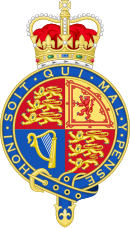Our website is made possible by displaying online advertisements to our visitors.
Please consider supporting us by disabling your ad blocker.
Judicial Committee of the Privy Council
| Judicial Committee of the Privy Council | |
|---|---|
 | |
 | |
| 51°30′01.3″N 0°07′41.3″W / 51.500361°N 0.128139°W | |
| Established | 14 August 1833 |
| Jurisdiction | List of countries
|
| Location | Middlesex Guildhall, City of Westminster, London, England |
| Coordinates | 51°30′01.3″N 0°07′41.3″W / 51.500361°N 0.128139°W |
| Authorised by |
|
| Website | jcpc |
The Judicial Committee of the Privy Council (JCPC) is the highest court of appeal for the Crown Dependencies, the British Overseas Territories, some Commonwealth countries and a few institutions in the United Kingdom. Established on 14 August 1833 to hear appeals formerly heard by the King-in-Council,[2] the Privy Council formerly acted as the court of last resort for the entire British Empire, other than for the United Kingdom itself.[3][4]
Formally a statutory committee of His Majesty's Most Honourable Privy Council, the Judicial Committee consists of senior judges who are Privy Councillors; they are predominantly justices of the Supreme Court of the United Kingdom and senior judges from the Commonwealth of Nations. Although it is often simply referred to as the "Privy Council", the Judicial Committee is only one constituent part of the Council. In Commonwealth realms, appeals are nominally made to "His Majesty in Council" (i.e. the British monarch as formally advised by his privy counsellors), who then refers the case to the Judicial Committee for "advice", while in republics in the Commonwealth of Nations retaining the JCPC as their final court of appeal, appeals are made directly to the Judicial Committee itself. The panel of judges (typically five in number) hearing a particular case is known as "the Board". The report of the Board is, by convention, always accepted by the King-in-Council as judgment.

- ^ https://www.jcpc.uk/ [bare URL]
- ^ "Judicial Committee Act 1833".
- ^ P. A. Howell, The Judicial Committee of the Privy Council, 1833–1876: Its Origins, Structure, and Development, Cambridge, UK: Cambridge University Press, 1979
- ^ "Practice direction 1". The Judicial Committee of the Privy Council. Retrieved 8 January 2024.
Previous Page Next Page
Dēmenda Gemōt þæs Sundorgeþinges ANG Comitè Judicial del Consell Privat Catalan Statsrådets Retsudvalg Danish Judicial Committee of the Privy Council German Juĝa Komitato de la Privata Konsilio EO Comité Judicial del Consejo Privado Spanish کمیته قضایی شورای سلطنتی FA Comité judiciaire du Conseil privé French प्रिवी काउंसिल की न्यायिक समिति HI Komite Yudisial Dewan Penasihat ID


